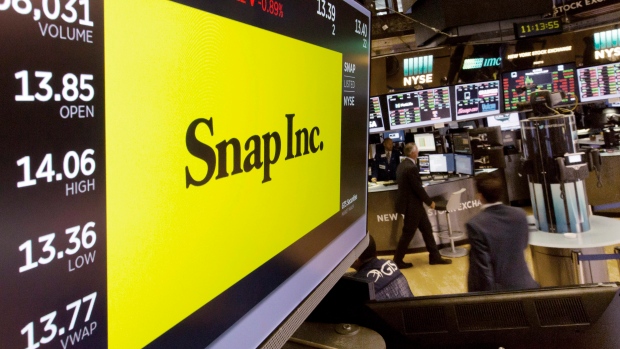Aug 11, 2017
Snap founders not selling shares as stock slumps
, Reuters

Snap Inc (SNAP.N) Chief Executive Officer Evan Spiegel said on Thursday neither he nor co-founder Bobby Murphy would sell shares of the Snapchat parent this year, but that failed to soothe investors after quarterly results fell short of analyst expectations.
Shares of the Los Angeles company slumped nearly 17 per cent in extended trading. A lock-up period preventing insiders from selling the shares, which since their March market debut have been pressured by investor concerns about user growth, expired at the end of July.
"Given the amount of speculation around the lock-up expiration, I feel it is important to note that Bobby and I will not sell any of our shares this year," Spiegel said on a call with analysts. "We believe deeply in the long-term success of Snap."
Snap reported daily active users and second-quarter revenue below analyst forecasts, sending shares down to US$12. The stock debuted on March 2 at US$24, compared with an initial public offering price of US$17.
Spiegel and Murphy’s commitment to hold on to their shares will provide a slight boost of confidence for worried investors, said James Gellert, CEO of RapidRatings, which assesses the financial health of companies.
“That in and of itself doesn’t create support for Snap, but it should reduce the people who are inclined to flee based on the performance,” Gellert said.
Investors worry about the company's ability to vie for users and advertising dollars with rivals like Facebook Inc's Instagram, which has features similar to the Snapchat disappearing messaging app.
Snap said its daily active users (DAUs) rose to 173 million in the second quarter, short of the 175.2 million DAUs expected by analysts, according to financial data analytics firm FactSet.
DAUs were 143 million in the year-earlier quarter and 166 million in the previous quarter.
Average revenue per user was US$1.05 in the quarter, Snap said, below the US$1.07 expected by analysts according to FactSet but up from 50 cents a year earlier.
"There is a lot of heavy competition and the company has not figured out how to monetize its audience yet," said Salvatore Recco, executive vice president at 50 Park Investments, an investment advisory service. "Until they do, investors will likely continue to be disappointed."
Instagram Stories allows users to post images and video that disappear after 24 hours, a feature that replicates Snapchat.
Instagram Stories, which debuted a year ago, had 250 million users as of June, up from 200 million in April.
Since it first appeared on the public markets, Snap has described itself as a "camera company," but has given little indication on plans to move into hardware or its broader strategy.
"If that's how (Spiegel) wants to play his cards that's fine, but there's going to be a trade off," said Jason Moser, analyst for Motley Fool. "And that's going to be reflected in the stock price.”
Spiegel was more forward with the company’s strategies on Thursday, saying Snap's focus will be on building creative tools that give users more ways to create snaps. Spiegel said this plan creates a cycle where users create and view more snaps.
As an example, Spiegel cited the company's World Lenses feature released this quarter. The executive pointed to Snapchat's dancing hot dog, saying the animated character was viewed more than 1.5 billion times in the app.
"Our dancing hot dog is most likely the world’s first augmented reality superstar," Spiegel said.
Additionally, Spiegel said the company is working to stabilize the backend infrastructure of Snapchat’s Android app. With better performance and stability, Snap expects Android users will use the app more often.
Those efforts should begin to produce meaningful results by mid-2018, Spiegel said.
“We’d really like to see Android users more engaged,” he said.
Some analysts praised the company’s progress in user growth and revenue, even though it failed to meet market expectations.
Johnny Won, founder of tech consulting firm Hyperstop, said the market is not recognizing Snapchat’s potential as a mobile-first service.
“There is no technology platform that is specializing on a vertically focused video content network at the scale that Snapchat has targeted,” Won said.
Snap said its revenue more than doubled to US$181.7 million in the quarter, below analyst expectations for US$186.2 million. The company earns some revenue from branded or sponsored filters and lenses, but the bulk comes from advertisements.
Net loss widened to US$443.1 million, or 36 cents per share, from US$115.9 million, or 14 cents per share. Excluding certain items, Snap lost 16 cents per share in the latest quarter.






